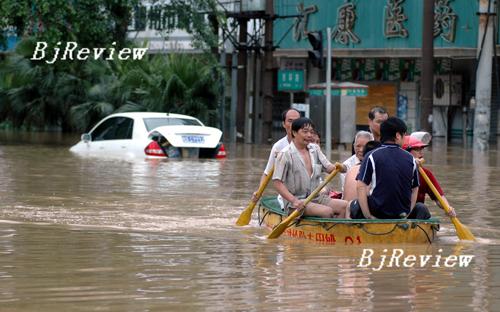
How Could They Do This to the Children?
Recent media exposures of child abuses taking place at unlicensed brick kilns in north China’s Shanxi Province have drawn a lot of attention from throughout the country. It is reported that children and many adults are forced to work in brutal conditions: scantily clothed, unpaid and fed only on water and steamed buns-in virtual slavery.
Thousands of children and poor farmers, the youngest eight years old, were first cheated by human traffickers and then sold to the owners of brick kilns. The owners ran their operations like prisons: using fierce dogs and thugs who beat those who tried to escape or who worked slowly.
It is shocking that such horrible things should have happened in a civilized society under rule of law. While denouncing the cold-blooded kiln owners, people can’t help asking where the local governments and police authorities are when the enslaved laborers are abused? How has this crime managed to go on for more than a decade?
The dereliction of local governments and even collusion between officials and kiln owners are plain to see. A civilized society will not tolerate such cruel slavery and those who are responsible must be brought to book.
Jinan Times
Bridge Collapse Damages Public Trust
On June 15, the Jiujiang Bridge in Foshan, south China’s Guangdong Province, collapsed after one of its piers was hit by a sand-laden barge. This accident has been a big talking point among the public and various suspicions and criticisms on the quality of the construction have been voiced.
According to a press conference convened by the local government on June 20, several of China’s top bridge experts confirmed that the 20-year-old Jiujiang Bridge was built with its pillars designed to withstand an impact of 1,200 tons and its arches 40 tons, all exceeding mandatory safety standards.
However, once the public has developed doubts about bridge quality, it’s hard to remove the stigma.
First of all, although experts from all over the country had been invited to diagnose the collapse, the investigation was organized by the parties suspected of being accountable for this accident. Thus, the process was not as authoritative as people had expected. Worse still, the June 20 press conference lasted only 30 minutes and the participating experts didn’t take questions from the journalists.
To deal with the Jiujiang Bridge accident is not merely a technical issue, as so many doubts from the people need to be tackled. If the authorities want to win public trust, they must reveal the truth to the public in a formal way and the investigation results must be based on solid information.
Nanfang Daily City News
Trade Unions-No Thanks
According to Tang Weiying, Chairman of the Guangdong Provincial Federation of Trade Unions, most foreign-funded enterprises in China that refuse to accept trade unions are for fears that organized workers may embark on wage strikes or other protests.
Compared with employers, employees are at more of a disadvantage and in a weaker position, so they will not strike without good cause. If they do, it must be that their legitimate rights and interests are threatened.
The underpaying incident in Guangdong’s McDonald’s and KFC reveals serious labor abuses by foreign-owned businesses in China. The All-China Federation of Trade Unions claims that since these restaurants have violated China’s Labor Law, it will conduct a thorough probe into the incident and free legal aid will be offered to involved workers where necessary.
Nowadays, trade union organizations at various levels are playing an increasingly important role in promoting harmonious labor-management relations. Nevertheless, as far as some foreign-owned enterprises are concerned, active trade union organizations will undoubtedly restrict their power over company staff. This may explain all their efforts to keep out trade unions.
China Business Times
Corruption Hampering Disaster Relief
It seems that this year’s rainstorm disasters around China will continue for some time, which means there is still much relief work to do.
In line with the usual practice, relief activities are covered by the government administrative system and operate under the auspices of government officials at various levels. Nevertheless, while openness and transparency are still a problem, the media can hardly carry out effective supervision. Under the current circumstances, it’s even more difficult for such external forces as civil groups and international organizations to interfere.
No one can deny the complexity of relief work, but it’s complicated not because of the technical problems, but the complex network of the relief system. In some cases, relief materials failed to reach the victims as the Central Government or provincial governments had planned. It’s a pity that the victims--the direct targets of the relief--have no supervisory power over the relief distribution process.
It’s hoped that all the relief goods can reach those who badly need them. At the same time, there must be a consensus that the success of the relief work does not lie in whether there are enough financial resources or how serious the disasters are, but how to successfully curb corruption in the process of relief efforts.
Nanfang Daily | 